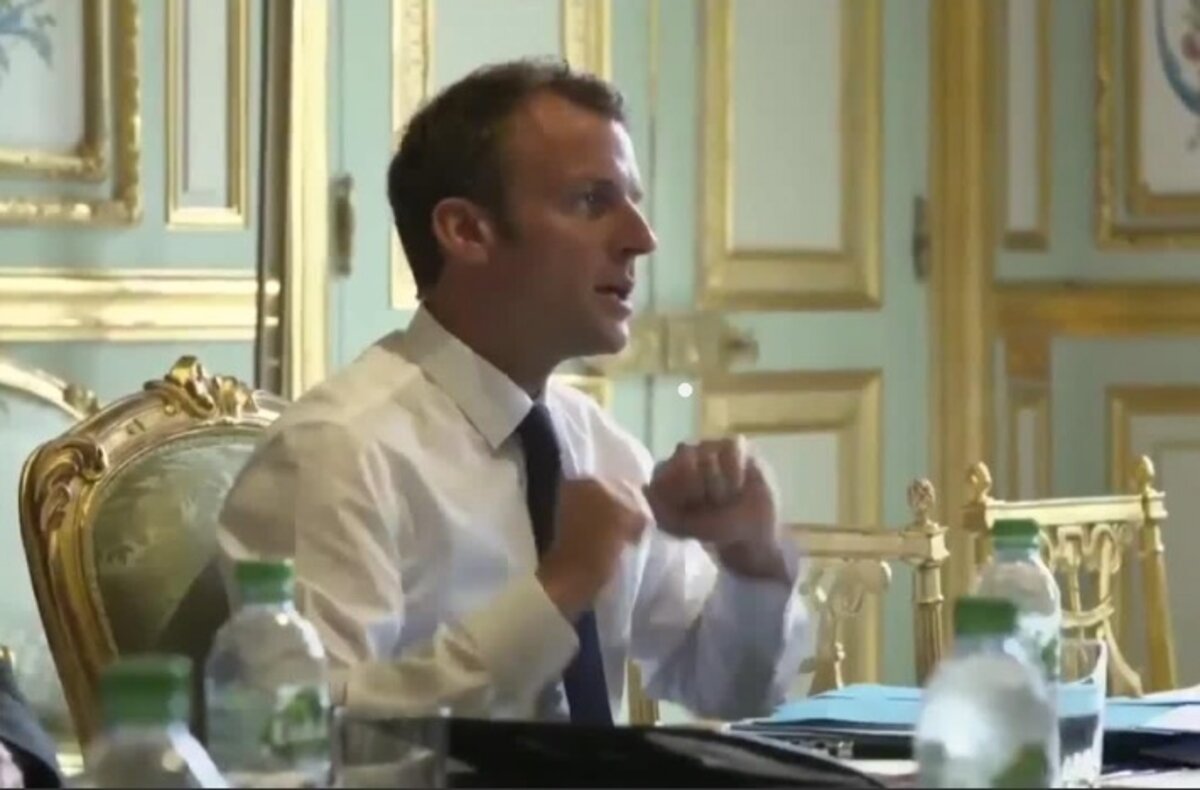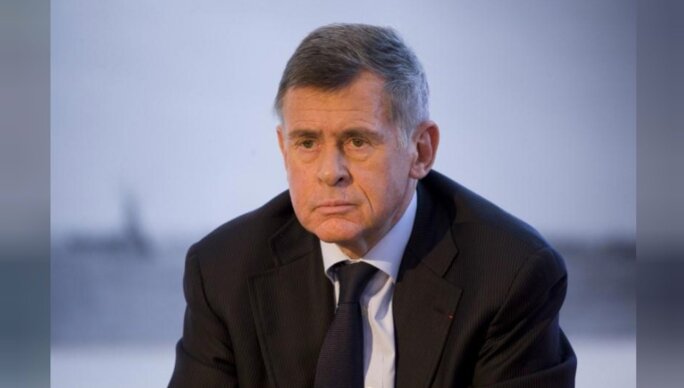It was a curious affair. In the way it was staged, President Emmanuel Macron's comment about the “shedloads of dosh” the state spends on benefits came across like an edgy fly-on-the-wall documentary as he addressed the faithful. In fact it was no such thing. It was simply part of yet another official press release issued by the Élysée's PR team to glorify their leader's actions.
However at first glance, the format of the president's comments does resemble the scene in which the controversial leader of the right-wing Les Républicains, Laurent Wauquiez, was filmed earlier this year making some harsh comments about his colleagues and former colleagues to a group of students. It is a political version of reality television, in which the political leader concerned is glimpsed through a digital keyhole. A moment where the politician is caught in the act, telling it as it really is, an action designed to create a good impression with members of the public.

Enlargement : Illustration 1

The episode brings to mind the time in 2008 when President Nicolas Sarkozy told an angry farmer at an agricultural show to “sod off”; his PR team hoped that this vulgar use of language would play well with the public. This was Trump-like before President Trump, suggesting the French head of state was anti-system, prepared to call things as he saw them and state the naked truth.
The problem with naked truths, however, is that they are often obscene. For what these episodes reveal is rather more than the exhibitionist intends to put on display. In Emmanuel Macron's case it seems he had wanted to speak about what different social benefits cost in relation to their effectiveness. So according to the Élysée, his comments were not intended as an attack on the overall level of resources spent on such benefits, but simply a reflection how they can best be used. His aim, they say, was not to point the finger at poor people but to help them escape poverty.
Yet look what happened. This so-called spontaneous message rebounded on the Élysée, where officials were forced to defend the president, and whose main message was completely lost in the ensuing controversy. Worse still, the president managed to confirm, underline and etch in stone the very image that he had sought to dispel: that he was indeed the “rich people's president”.
The reason is that, when it starts to run out of control, PR spin can sometimes act rather in the manner of a slip of the tongue. It then reveals the very truth or ulterior motive that the speech or stunt intended to conceal.
Politics has many famous examples of this. One of the most famous during France's Fifth Republic occurred when the National Assembly was debating a law on erotic film regulations. The Gaullist MP Robert-André Vivien was addressing the minister for the economy and finances, Jean-Pierre Fourcade and had intended to urge him to “harden ...your text”, in other words the bill's measures. But instead of the word 'texte' he said 'sexe' – the French word for penis.
In 2010, and on a different front, government minister Éric Woerth suffered a similar lapse while defending on RTL television his fight against tax fraud. “On the contrary, I've begun all the procedures to reinforce tax fraud,” he declared.
The “shedloads of dosh” expression uttered by Emmanuel Macron works in much the same way. Unbeknown to the speaker himself, this expression reveals in one simple phrase how the president regards state measures to help poor people. Instead of these proceeds from people's taxes being called “credit”, “aid,”, “investment”, “grant”, or a “contribution”, it is referred to as “dosh”. It is as if the president is trying to imitate bar-room chatter. And this state expenditure is not then described as “important”, “necessary”, “useful”, “urgent” or even “badly-targeted”, but as “shedloads”.
When Emmanuel Macron uses this type of language he is not just adopting a populist style; for him it is something more personal too. For he only uses such words in certain circumstances, when he is talking about what the former prime minister Jean-Pierre Raffarin once called “France below”, whose members Macron himself describes as “people who are nothing” or “illiterate”, or even “slackers” and “idlers” to whom he will “yield nothing”.
Compare this choice of words to those he uses when he described leaders in society, the “first in the rope team” as he has described them. On such occasions he drops the slang and uses rather grander terms, expressions that tell a collective narrative. One for all and all for one. “If you start to throw stones at [the first in the rope team] the whole rope team falls,” Macron has said.
Then there was the careful language that the president used to describe tax havens during his long debate earlier this year with journalists Jean-Jacques Bourdin and Edwy Plenel, Mediapart's co-founder and publishing editor. Then there was no question of “dosh” that you stash away or “dough” that you nick from a country, not even in the case of tax exiles. Instead there was sophisticated semantics: “In Europe you have differences in taxation that don't create fraud. Because it's not tax fraud, it's called tax optimisation … On one side there's fraud. We fight against fraud. And we punish that. And there's optimisation. We have a problem of tax optimisation,” said the president. As one of Molière's characters declared in the play The Misanthrope: “In what pretty terms these thoughts are put!”
The chief executive's dosh
By a quirk of timing another story about “dosh” has also been making headlines. This involved a theme every bit as recurrent as the suspicions over state benefits. It concerned a 13 million euro severance payment for Georges Plassat, former chief executive of supermarket chain Carrefour, who was also guaranteed a hefty pension of 500,000 euros a year. Over the years there have been numerous similar stories of company bosses who have benefited from huge pay-offs, including Noël Forgeard of aerospace company EADS, Antoine Zacharias of construction firm Vinci, Serge Tchuruk from electronics firm Alcatel and Denis Gautier-Sauvagnac of the metal industry employers' group UIMM.
It is hardly necessary to highlight the different choice of words employed by President Macron when referring to this, the latest in this long line of golden parachute payments. There was no mention of “shedloads of dosh” but instead a reference to a “code of good conduct”, the “decision of shareholders” of “boards of directors”.
Wrong-footed over the issue, Emmanuel Macron has subsequently let it be known that he had “got very angry” and “criticised the crazy dosh” involved. It was an attempt to show that he did not have double standards when it came to money. We look forward to the video showing this particular outburst of anger on the president's part...

Enlargement : Illustration 2

There is no doubt that the president has got himself in a tangle in these rows over “dosh”. Thinking he was showing the common touch, he ended up shocking people. Thinking he was relating to ordinary people, he ended up behaving like a street pedlar. His aim had been to do what Nicolas Sarkozy had tried to do: play off the hard graft of those who work and pay their taxes (“people who get up early” as he has himself described them) against the supposedly lazy people who put their feet up and abuse public money. But his video PR stunt did not work. The French expect their president to put on an appearance, not to slum it when the occasion suits.
As part of the backlash, his own caricature was turned against him. After his video was broadcast, people using social networks in France to return the favour to the president, making the most of two other news items. One was the revelation that the Élysée had spent 500,000 euros on new crockery from French manufacturer Sèvres. The response on social media? “Shedloads of dosh”. It also emerged that President Macron used a presidential Falcon jet for a series of trips within France. The reaction from social media? “Shedloads of dosh”.
These backlashes did not have a great deal in common with the original row over state benefits. There is nothing particularly scandalous about the French presidency using some of the most beautiful items the country produces to entertain its guests from around the world, for a third of the cost of the Brazilian football star Neymar's monthly pay. And President François Hollande's brief flirtation with travelling by rail taught us that presidential trips amount to rather more than picnics.
But with his talk of “dosh”, Macron has reaped a whirlwind, as well as some broken crockery. However, the social media backlash is not the worst of it. For if the president ends up by repelling centre-left voters who could have voted for him, that is his lookout. No, the worst aspect of this affair is that Emmanuel Macron has been indulging in a collective addiction that has afflicted France for a long time.
For by taking this populist stance on state benefit payments, the president is reinforcing a 30-year and growing tendency for all state actions, all state expenditure, large or small, to be regarded with suspicion. The fact of needing help from the state has become labelled the dependency culture, people in need of help have been cast as welfare profiteers, and social protection has become seen as an unsustainable burden. But while public money is an issue that is under permanent suspicion, private money is spent freely and without a murmur.
The complacency shown towards rich people's money under President Macron, and his patronising attitude in relation to poor people's money, do not just stem from a personal disdain for French society. They are a reflection of society and have become a driving force of the presidency since Macron came to office.
For whether we like it or not, a large section of France is like the president in the way he reacts. People are mistrustful and critical when a single euro of public money is at stake or being badly spent, but remain indifferent when billions are shuffled around by private interests or are spirited off to wherever. It is as if there are two countries in one, two systems of values, two sets of morality. A public country and a private country.
That explains why, in the same week as the social networks cheerfully laid into Macron's “dosh” comments in their reaction to the crockery and presidential jet stories, they were generally more moderate when it came to the financial fate of Carrefour's former boss. It also explains the reaction to yet another row over money. But this time the public was not criticising the people who were the recipients of large amounts of money. Indeed, quite the contrary, the public was offended that anyone should make fun of them.
The target of public criticism in this case was news presenter Anne-Sophie Lapix, who anchors the main 8pm bulletin on public broadcaster France 2. In fact, she faced such a prolonged Facebook and Twitter campaign that she had to make a public apology. Her offence? When announcing the opening of the World Cup in Russia on her bulletin, the presenter had dared to speak of the “millionaires running after a ball”.
---------------------------------------------------------------------------
- The French version of this article can be found here.
English version by Michael Streeter


